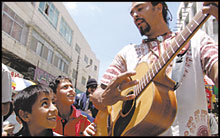|
Taken from Pittsburgh Post-Gazette (September 15, 2006)
'I Know I'm Not Alone'
Franti takes a stunning journey through Middle East
by Scott Mervis, Pittsburgh Post-Gazette

Michael Franti hits the streets of Baghdad
with his guitar in "I Know I'm Not Alone." |
Michael Franti's "I Know I'm Not Alone" will screen at the Amnesty International Film Festival to all the wrong people, a plugged-in, conscientious group who will laugh, cry and come out feeling more impassioned than when they came.
But imagine this: What if one night for 93 minutes, they pre-empted the nightly news, sent home "Hannity & Colmes" and screened this for the American public?
Something tells me there would be some changes in foreign policy.
"I Know I'm Not Alone" is a war indictment every bit as moving and powerful as Michael Moore's "Fahrenheit 9/11" without the divisive politics and snide jokes. In fact, the name "Bush" is only mentioned once or twice.
Franti, of the spiritually charged reggae/hip-hop group Spearhead, is a longtime musician, first-time filmmaker. As he explains, "This film came out of my frustration with watching the nightly news and hearing generals, politicians and pundits, explaining the political and economic cost of the war in the Middle East, without ever mentioning the human cost."
To see it with his own eyes, he bought a plane ticket to Baghdad and arrived with a small film crew, two human rights lawyers and a retired U.S. Army captain. The second stop on his tour was the West Bank.
As one of his interview subjects jokingly observes, "You're kind of psycho, I see."
No doubt. But Franti had other qualities for the job, ones that few reporters can match. Standing head and shoulders above most of the crowd with long dreadlocks, Jamaican garb and an irresistible smile, he looks like a prophet carrying his guitar through the war-torn streets.
The guitar acted as both a shield to protect him and a sword to break down barriers. He makes up a song using a single Arabic word -- "Habibi," meaning "my dear friend" -- and the way Iraqi people of all ages are drawn to him, singing and clapping, you'd swear they'd elect him president.
We hear his intelligent Iraqi driver and tour guide talk of living in the ruins, with constant fear of explosions, frequent blackouts and insufficient medicine. He estimates the civilian death rate between 100,000 and 150,000, then expresses his wish that Americans and Iraqis can become "friendly."
Franti finds a mixture of characters: families who have lost loved ones, a tattoo artist who couldn't work under Saddam, American soldiers who dream of home and an Iraqi "death metal" band called the Black Scorpions, with one member who pines for America's natural beauty: "I'd offer the rest of my life just to sit next to a lake or something."
Bring tissues to the theater for the scenes in the hospital, particularly of one sweet, doe-eyed boy who sits on a bed, nothing but bandages where his legs should be.
Franti exits Baghdad, leaving you wanting more, but the Israeli-Palestinian scenes become just as compelling. He discovers a band called Sheva made up of Israelis and Palestinians, and a support group of mothers from both sides who have lost children to violence.
A teenage Palestinian girl who looks like any Avril Lavigne fan lets out an interesting slip about how badly her people are perceived: "We can throw stones," she says, "but we can also dance, smile, speak, laugh. We're like humans. ... I mean, we are humans."
Ultimately, Franti ends up along a dusty barbed-wire fence bordering the occupied territories, where he gets soldiers and Palestinians talking about how they could be friends if governments could just get along.
Although Franti and his poetic songs, used effectively over photo montages, are in the center of the action, this is not a soapbox. He makes no judgments, no speeches; there's no harassing of subjects and, unlike the news, he gets well beyond the hysterical sound bites. By the end, we've seen a lot of pain but, somehow, are left with a hopeful feeling that people are people and, whether they're Palestinian kids, Iraqi cab drivers or Marines with M-16s, they wouldn't mind a little peace.
"The trip made me realize one very important thing," Franti concludes, "which is that I'm not on the side of Iraqis, Israelis, Palestinians or Americans. I'm on the side of the peace makers, whichever country they
come from."
(Weekend editor Scott Mervis can be reached at smervis@post-gazette.com or 412-263-2576.)
|